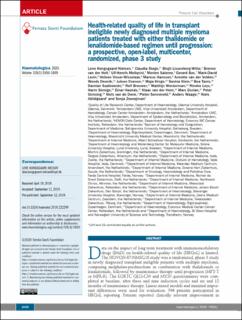Health-related quality of life in transplant ineligible newly diagnosed multiple myeloma patients treated with either thalidomide or lenalidomide-based regimen until progression: a prospective, open-label, multicenter, randomized, phase 3 study
Nielsen, Lene Kongsgaard; Stege, Claudia; Lissenberg-Witte, Birgit I.; van der Holt, Bronno; Mellqvist, Ulf-Henrik; Salomo, Morten; Bos, Gerard; Levin, Mark-David; Visser-Wisselaar, Heleen; Hansson, Markus; van der Velden, Annette W.G.; Deenik, Wendy; Coenen, Juleon; Hinge, Maja; Klein, Saskia K.; Tanis, Bea C.; Szatkowski, Damian Lukasz; Brouwer, Rolf E.; Westerman, Matthijs; Leys, Rineke; Sinnige, Harm A.M.; Haukås, Einar; van der Hem, Klaas G.; Durian, Marc F.; Gimsing, Peter; van de Donk, Niels; Sonneveld, Pieter; Waage, Anders; Abildgaard, Niels; Zweegman, Sonja
Peer reviewed, Journal article
Published version
Permanent lenke
https://hdl.handle.net/11250/2993669Utgivelsesdato
2019Metadata
Vis full innførselSamlinger
Originalversjon
10.3324/haematol.2019.222299Sammendrag
Data on the impact of long term treatment with immunomodulatory drugs (IMiD) on health-related quality of life (HRQoL) is limited. The HOVON-87/NMSG18 study was a randomized, phase 3 study in newly diagnosed transplant ineligible patients with multiple myeloma, comparing melphalan-prednisolone in combination with thalidomide or lenalidomide, followed by maintenance therapy until progression (MPT-T or MPR-R). The EORTC QLQ-C30 and MY20 questionnaires were completed at baseline, after three and nine induction cycles and six and 12 months of maintenance therapy. Linear mixed models and minimal important differences were used for evaluation. 596 patients participated in HRQoL reporting. Patients reported clinically relevant improvement in global quality of life (QoL), future perspective and role and emotional functioning, and less fatigue and pain in both arms. The latter being of large effect size. In general, improvement occurred after 6–12 months of maintenance only and was independent of the World Health Organisation performance at baseline. Patients treated with MPR-R reported clinically relevant worsening of diarrhea, and patients treated with MPT-T reported a higher incidence of neuropathy. Patients who remained on lenalidomide maintenance therapy for at least three months reported clinically meaningful improvement in global QoL and role functioning at six months, remaining stable thereafter. There were no clinically meaningful deteriorations, but patients on thalidomide reported clinically relevant worsening in neuropathy. In general, HRQoL improves both during induction and maintenance therapy with immunomodulatory drugs. The side effect profile of treatment did not negatively affect global QoL, but it was, however, clinically relevant for the patients. (Clinicaltrials.gov identifier: NTR1630).

